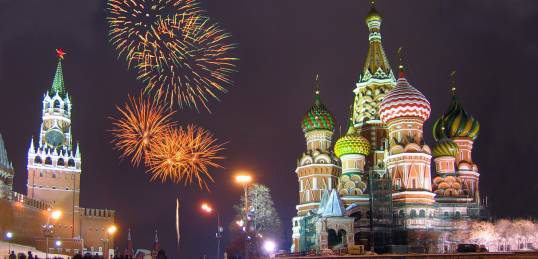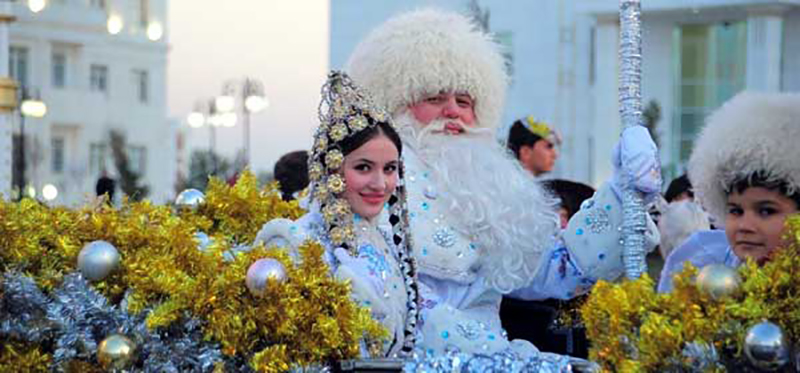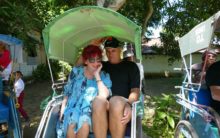It is probably easier to provide a list of the celebratory dates in Russia in January and then explain each. The bottom line however is to learn to pace yourself through these frenetic parties. The Russians know how to drink and to eat and to party without after effects. We westerners are total amateurs. Regardless, Russia in January is pretty full on and you will certainly get a blend of the old and the new. It is very cold in January in Russia, so it a perfect time to celebrate.
Scheduled Celebrations
Contents
31st Dec – New Years Eve
1st December – New Years Day
7th January – Christmas Day
14th January – Old New Years Eve
7th to 19th January – Svyatki, Russian Christmastide celebrations.
(20th-31st – recovery I would imagine)
The biggest is the ‘new’ New Years celebrations. (31st Dec/1st Jan)
That’s correct the Russians have 2 New Years celebrations. One in line with much of the world and the Julian calendar and the other to celebrate the old Orthodox calendar when New Year fell on the 14th January.
The first one is a massive celebration. Fireworks and concerts are the big features of this night. Also there is considerable vodka drinking as well as food consumption. The Russian equivalent to Santa Claus is named Ded Moroz, or Father Frost. Snegurochka the Snow Maiden accompanies him, and he brings presents to children to place under the New Year’s tree. He carries a staff, wears valenki and is carried across Russia in a troika.
Russians welcome in the New Year by saying “S Novim Godom!” FYI
Christmas (7th January)
Christmas in Russia is held on the 7th of January. This is a big family day with a lot of food and certain rituals. Whilst Christmas is relatively new again for Russians it is celebrated by a lot of people now.
Some people fast on Christmas Eve until the first star has appeared in the sky, whilst others will not touch any meat. People then eat ‘sochivo’ or ‘kutia’ porridge made from wheat or rice served with honey, poppy seeds, and fruit.
Other popular Christmas Eve foods include borsch, vegetable pies and salads. Sauerkraut is the main dish in the Christmas Eve meal.
‘Vzvar’ is often drunk at the end of the meal. It’s a sweet drink made from dried fruit and honey boiled in water. Vzvar is traditionally at the birth of a child, so at Christmas it symbolizes the birth of the baby Jesus.
Russia’s Old New Year (14th January)
The old New Year celebrations are rich in folk traditions, like the singing of carols and the telling of fortunes, also accompanied by a lot of food and a lot of drink.
Svyatki, Russian Christmastide (14th-19yh January)
Svyatki, Russian Christmastide follows the celebration of Christmas and lasts until January 19, the day Epiphany is celebrated. It is basically an extended Christmas celebration.
Old Slavic traditions included lighting fires so this is very much a feature of this period. Svyatki fortune telling is a also another, like melting wax then pouring it quickly into cold water or snow which is believed to predict events for the coming year.
The Russian caroling is called the koliadki, and the carolers, or mummers, may dress up in costume. This is very popular with the Russians.
Epiphany in Russia (19th January)
January 19, the last day of Svyatki, marks Epiphany. On this day a lot of people jump into the icy waters of rivers and lakes. Epiphany marks the baptism of Jesus, and it is said that the water with has special powers that will protect those who bathe in it on this day.
So January in Russia, is a month full of celebrations. Learn to pace yourselves.
[easyazon_link asin=”1741795796″ locale=”US” new_window=”default” nofollow=”default” tag=”wwwcontentravel-20″]Lonely Planet Russia (Travel Guide)[/easyazon_link]






Hi Paula, may I know what is the best and cheapest way to roam in Russia?
I think an organised tour is easiest
I never knew that January was such a popular month in Russia but it looks to me like this is the best time to venture there if you are looking to have a good time. You should probably be wary of the weather though especially if you get a little too tipsy after a long night and find yourselves wandering the streets of Moscow in those freezing, frigid temperatures!
Great way to warm up though
I want to visit Russia and pacing oneself in travel is important #AtoZchallenge ☮Peace ☮ ღ ONE ℒℴνℯ ღ ☼ Light ☼ visiting from http://4covert2overt.blogspot.com/
Wow, our motto in life and everything is serendipity. See we have bonded already 🙂
Wow, I didn’t realize January was such a busy month in Russia – and to think that they followed it this year with the Olympics! I really want to see fireworks over Red Square
I want to see fireworks also. Interesting that there big January led up to Olympics – hmmmm 🙂
It does look cold in January, but as I said in my Russia post…they have a cure for that! How do we keep picking the same subjects Paula?
I love that we have the same letters and such different approaches. Can’t wait to see why you do with “X”